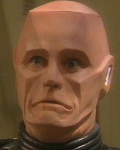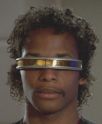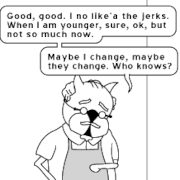|
Pwnstar posted:If you think the Doctor running around trying to fight a monster he can't see and attacking a fence isn't a fun sci-fi adventure then I'm sorry about your life. I'd forgotten most of the episode except for the big speech about how Van Gogh was the best person who ever lived, so being reminded that it had some actual really good bits like that was a nice time.
|
|
|
|

|
| # ? Apr 27, 2024 03:42 |
|
Bicyclops posted:That's my favorite thing about it, I think. That the epiphany means so much to him but ultimately doesn't "save" him. It wasn't about some kind of objective outside approval or metric for success, it was something deeper about his cognition; he needed actual help. In fact, it's one of issues sometimes with the mental health profession is how the metrics for healthy can correspond to outside factors like "Well, are they working an eight hour day?" I still think some of the reason that my friend slipped under the radar is that she was getting good marks and going to school every day (in a school where a lot of people weren't), and she had some acceptance letters to some very good art schools. I do think that some of that was rewarding for her, but she needed someone to address her affect. Yeah, that's one of the things I really love about it. However, I've never had to experience depression for myself, and though I've known people who do it makes it difficult for me to really understand or see things from that perspective, and so there is no way for me to judge whether it came across as genuine or condescending or manipulative. I imagine every individual person who has suffered some kind of mental health issue would view it in their own individual, subjective way as well, and who the hell am I to tell them they're getting the "wrong" message from it. On a purely cosmetic front though, the moment that really stands out to me is that glorious shot of Amy sitting amongst the sunflowers.
|
|
|
|
Bicyclops posted:That's the message I took away, was that the It's-a-Wonderful-Life "But look! Look how much people love you!" approach, while deeply touching, is not some magical cure. One of the many things I appreciate about CBS's "Elementary" is that it presents recovery as a never ending process, not as an instant phenomenon.
|
|
|
|
I think it's maybe important, with respect to Toxx, to say that it's alright to have an opinion on episodes that deal with issues of mental health without having directly experienced the subject matter. I avoid talking too much about direct personal experiences with depression or suicide for a whole host of reasons but I think the cat is way out of the bag on these forums about my OCD, and while it gives me a particular vantage point when talking about shows like Monk or that Audrey Niffenegger book that wasn't A Time Traveler's Wife, it does not vest me as the sole authority on the subject, and other people with OCD disagree on certain points about the disorder as portrayed in fiction with me. I especially worry about people who have experienced suicide attempts but understandably don't want to talk about their own lives but do feel like they have a valid opinion to express.
|
|
|
|
I remember being a big fan of this episode when I first saw it, in large part because I grew up in an Impressionism loving household. It was really interesting to see a troubled and utterly human portrayal of a person I mostly knew through the history books. That it didn't have a "happy ending" was wrenching, but made it feel more believable. Pretty much the only other source of reviews I've read before on Who have been the Slant or AV Club reviews, so it's been enjoyable to see so many different opinions on the eps.
|
|
|
|
This was actually the first episode of Doctor Who I ever saw. My wife and I happened to tune in to a marathon on BBC America a few months after season 5 ended and we were hooked enough to keep watching through to the end of the season finale that same night. We actually tuned in at the end of the preceding episode, so I got to see the Rory stuff without having to watch everything that came before it. It's definitely true that the end of Cold Blood is almost a completely separate mini-episode, and seeing just that scene made it pretty easy to follow the season-spanning story line. I find it a bit funny to think that if I'd turned on the TV just an hour earlier, I might not have ever felt the need to watch any more of the show. Being my first experience with the show it definitely colored my idea of what Doctor Who actually is going forward, and it may be part of the reason I prefer the 'smaller' episodes that focus more on the characters and their interactions rather than the monsters and the world-ending threats (which is not to say those episodes can't be good in their own right). Watching it again, after reading some of the recent comments in this thread, I did end up looking at it a little differently. By the end it had hooked me again, however, and I found myself getting a bit teary eyed during some of the big moments. Logically, I've always felt Bill Nighy's speech at the end was far too schmaltzy, and yet it always ends up affecting me emotionally every time I see it. I have a hard time telling whether the actual serious issues the episode brought up were portrayed well or not, since they're not something I've had much personal experience with, but I've definitely found it interesting to read more from that perspective.
|
|
|
|
Yeah, I didn't take it as "mental illness helped him be an artist" and more that "this was an artist's struggle with mental illness." I mean, it's proven that art can be a coping mechanism. I didn't get the feeling that his issues were romanticized at all.
|
|
|
|
I loved this episode. Really good, and the stark treatment of depression at the end felt human and brave.
|
|
|
|
Mordiceius posted:Yeah, I didn't take it as "mental illness helped him be an artist" and more that "this was an artist's struggle with mental illness." I mean, it's proven that art can be a coping mechanism. I didn't get the feeling that his issues were romanticized at all. Yeah; a pretty key point is that he was shown at his most productive when he wasn't in deep depression. Romanticisation of mental illness tends to portray people hitting the downswing and then creating a work of genius, which is demonstrably opposite of what has happened in 99% of the case of well-known real-life artists and geniuses with mental illnesses.
|
|
|
|
Having been in the same boat with both suicide and mental illness I have to say I loved this episode because they didn't save him. The good things make life more bearable but they don't fix what's wrong, because the problem is internal. Also for me at least it seemed that Vincent was brilliant in spite of his illnesses, not because of them. For me it felt tragic to me that in spite of hating himself he had a desperate and eternal need to see the beauty in everything else. I could have done without Bill Night pandering, but it was important to the whole "You can't cure a depressive by cheering them up" message. Its a struggle. Also at the end of the BBC episode they had a message about if you have these issues and the episode triggered you, call this number to talk to someone, which was thoughtful. I unequivocally love this episode.
|
|
|
|
The idea of being able to communicate to great artists of the past that people will, in a hundred years, still really like their stuff is very powerful to me. I liked it in that daft Dickens episode too.
|
|
|
|
This episode is easily in my top 10, probably top 5, as well. I also identify with the messages about depression, but also because I already really loved Van Gogh long before this episode was made, to the point where half of the art hanging in my house is prints of his work. On top of that, the song that plays over the big "take Vincent to modern times and let him see the museum and hear Bill Nighy talk about how great he is" part (Chances by Athlete) already had a very deep and personal meaning to me long before I watched this episode, so them using that song for a moment where Van Gogh overhears how important he is brings me to tears every time, including when I rewatched this episode last night. That said, this is one of those episodes where I absolutely wouldn't argue with anyone who hates it deeply, because I can definitely see the problems with it, as well.
|
|
|
|
Annakie posted:On top of that, the song that plays over the big "take Vincent to modern times and let him see the museum and hear Bill Nighy talk about how great he is" part (Chances by Athlete) already had a very deep and personal meaning to me long before I watched this episode, so them using that song for a moment where Van Gogh overhears how important he is brings me to tears every time, including when I rewatched this episode last night. That song is the RichardCurtisiest saccharine thing and yet it hit me so hard. The idea of showing your favorite person from the past just how revered his work will be, in spite of any time laws, is just so appealing 
|
|
|
|
Annakie posted:This episode is easily in my top 10, probably top 5, as well. I also identify with the messages about depression, but also because I already really loved Van Gogh long before this episode was made, to the point where half of the art hanging in my house is prints of his work. I know that everyone likes Van Gogh but yeah, there's a reason. My wife has a blanket of starry night and she was very excited when this episode came up when we were watching through.
|
|
|
|
We actually had a print of The Church at Auvers in my house growing up, so seeing it in that episode with the weird little figure in it felt very unnatural, which I think played right into the intended feeling of the episode.
|
|
|
|
You can add me to the list of people who wish they had voted on their on opinions, rather than expectations or anyone else's. Parts of this episode were good - the way it ended was especially. I like the way he related it to Amy's situation, and wish they would've elaborated on her 'soldiering on' without understanding why. I also wonder if the 'invisible beast that only he could see' was supposed to be a metaphor that may not quite have hit the mark. But I really, really hate the bedroom scene depiction, and that pretty much wipes out any good will towards the episode. I get that you have to strongly externalize emotions in order to make them come across on the screen, but the bawling and shouting are uncharacteristic of the illness they're trying to portray. Sure, if someone actually is acting that way they need help, but I don't think I'm off base to say that in general, depression does not work that way. One significant problem with depression, I think, is actually identifying that it's happening, even on the part of the sufferer. Someone could easily watch this and think, "Well geez, I'm not THAT bad. I shouldn't exaggerate how I feel. Clearly I don't have real problems." I wish they could've toned it back some, or just not portrayed it on-screen at all.
|
|
|
|
Ali Aces posted:But I really, really hate the bedroom scene depiction, and that pretty much wipes out any good will towards the episode. I get that you have to strongly externalize emotions in order to make them come across on the screen, but the bawling and shouting are uncharacteristic of the illness they're trying to portray. Sure, if someone actually is acting that way they need help, but I don't think I'm off base to say that in general, depression does not work that way. Van Gogh didn't just suffer depression, but had severe psychotic episodes including seizures, hallucinations, periods of sudden erratic behaviour or of incoherence - the famous ear incident is an example of a time of several days that he had no recollection of afterwards. It's a very popular theory that he suffered from some form of epilepsy. MikeJF fucked around with this message at 16:06 on Feb 4, 2015 |
|
|
|
MikeJF posted:Van Gogh didn't just suffer depression, but had severe psychotic episodes including seizures, hallucinations, periods of sudden erratic behaviour or of incoherence - the famous ear incident is an example of a time of several days that he had no recollection of afterwards. It's a very popular theory that he suffered from some form of epilepsy. And possible Bipolar and Borderline personality disorder too.
|
|
|
|
Monagle posted:And possible Bipolar and Borderline personality disorder too. Let's not forget paint-induced lead poisoning.
|
|
|
|
HopperUK posted:The idea of being able to communicate to great artists of the past that people will, in a hundred years, still really like their stuff is very powerful to me. I liked it in that daft Dickens episode too. As cliche and goofy as they can be I love those episodes, with The Wasp and the Unicorn being my favorite.
|
|
|
|
This remains my favourite episode of television and the only piece if cinematography to have ever brought me to tears for the following reasons; -I'm one of the crowd with a history of depression and suicide attempts. -I'm from a dutch family, and my Oma and Opa had several copies of van Gogh paintings they brought over from Holland. Van Gogh's art was part of my childhood, and is still my favourite. -the fact they made such an uplifting yet depressing episode out of some subject matter that is mostly depressing is goddamned impressive.
|
|
|
|
Here's how strongly this episode hit me: This (in need of a wash) shirt is the only piece of Doctor Who merch I own. It's not official, but from one of those sites where you buy some person's original design which may or may not be original. It's one of my favorites, though overall I'd put it as my #2 in the revival overall, or #3 for the people who can't accept a two-way tie for the first spot. But it's not like I can find any decent shirts about "Midnight" or my other number one. Also, it's a Doctor Who shirt that isn't all "DOCTOOOOR WHOOOO" like so many of them are. I've learned from pro wrestling that the shirts that don't advertise exactly what it is your a fan of (such as Austin 3:16 or nWo logo) are often the best shirts.
|
|
|
|
I'm one of the few middle of the roaders on this episode. I see what it's trying to do, and the scene in the gallery was well done, but most of the rest of the episode left me cold. If I were grading it myself, I'd give it a C, maybe a B on the strength of the conclusion. Of course I also knew that most everyone else loved it and that it would resonate with Occ and guessed an A. Well, it was great being the Series Four champion. All that's left is to hand off my tiara to the new champion, because taking a huge hit like this so late in the season means I am done.
|
|
|
|
|
2house2fly posted:I'd forgotten most of the episode except for the big speech about how Van Gogh was the best person who ever lived, so being reminded that it had some actual really good bits like that was a nice time. Yeah, I thought it was an odd artistic choice to have Bill Nighy spend 5 minutes giving Van Gogh a sloppy blowjob, but I guess that's why I'm not working in show business. If I remember correctly, I guessed pretty high because of Toxx's grades for "The Doctor has adventures with historic/artistic figures in the past" as well as his enjoyment of Smith.
|
|
|
|
ThNextGreenLantern posted:Yeah, I thought it was an odd artistic choice to have Bill Nighy spend 5 minutes giving Van Gogh a sloppy blowjob, but I guess that's why I'm not working in show business. You're evaluating the "Artistic choices of Doctor Who" while finding it dumb because of the writer's opinion on art/an artist being expressed. Just in case you didn't catch that.
|
|
|
|
surc posted:You're evaluating the "Artistic choices of Doctor Who" while finding it dumb because of the writer's opinion on art/an artist being expressed. Just in case you didn't catch that. I was trying to use hyperbole to convey a grievance of this episode in a humorous fashion. I also enjoyed my juxtaposition of sloppy blowjobs and artistry.
|
|
|
|
ThNextGreenLantern posted:I also enjoyed my juxtaposition of sloppy blowjobs and artistry. we all did.
|
|
|
|
MikeJF posted:Van Gogh didn't just suffer depression, but had severe psychotic episodes including seizures, hallucinations, periods of sudden erratic behaviour or of incoherence - the famous ear incident is an example of a time of several days that he had no recollection of afterwards. It's a very popular theory that he suffered from some form of epilepsy. This is the only thing I disliked in this episode, because it seems to imply his ability to see an invisible monster was actually his psychosis, which is a lovely, lovely way to treat severe mental illness. It completely erases that aspect of his illness, which was extremely influential in his painting. It didn't give him super painting skills, but it did obviously affect the way he painted. I felt they handled his depression and BPD astoundingly well, though.
|
|
|
|
Doctor Who "Vincent and the Doctor" Series 5, Episode 10 Oh, so that's what a nothing episode of Series Five Who looks like. "Vincent and the Doctor" is an episode very much about mental illness, specifically depression, and suicide, two subjects I am intimately familiar with. As such, I came into this episode with a much more critical eye than usual. I don't...I don't hate "Vincent and the Doctor". But I don't love it either, and in fact I don't really much like it. It's an episode I look on and view with a shrug. The conceit of the episode hinges around The Doctor, still guilty over the events of "Cold Blood", desperately trying to assuage it by bringing Amy on a whirlwind tour of everything she's ever wanted to see, climaxing in a tour of an exhibition of Vincent Van Gogh (Tony Curran)'s work. He notices that in one painting of Vincent's, that of a church, there's a monster that's clearly not supposed to be there, so rushes back to 1890 (with Amy in tow) to investigate. The Doctor quickly meets up with Vincent, a drunken, self-hating depressive hated and derided by his peers. At the same time, however, a woman turns up dead on the street- mysteriously killed by an unseen force. Amy ends up charming Vincent, and in the process aggressively flirting with him, such that Vincent is content to let The Doctor and Amy stay at his house for the night. Unfortunately, at that exact moment the alien monster which had been killing random passersby- a Krafayis, a half chicken/half dog monster -shows up and attacks Amy. It turns out that the Krafayis is invisible to the naked eye and only Van Gogh can see it, making stopping the monster difficult to impossible. The Doctor then creates a device that can see the monster, and convinces Van Gogh to finally go and paint the church (so the Krafayis can show up). The Krafayis arrives, and The Doctor, still spooked from losing Rory, urges Vincent to stay behind as he goes to investigate the church and find the Krafayis by himself. This, of course, quickly goes wrong, and after a fair bit of run-shouting ol' Van Gogh accidentally slays the Krafayis. As its dying The Doctor learns that it was actually blind, alone, and scared, and lashed out because that was all it knew how to do, creating a somewhat bittersweet ending to the main plot. Let's address the overwrought and deeply, deeply embarrassing fourth act later and just criticize the episode itself, proper. What's interesting is that this is yet another "The Doctor and Companion go back in time to meet a famous artist from history" episode, which seems to be a near-annual thing at this point. I adore Van Gogh: as cliche as it is to say, "Starry Night" is my favorite piece of artwork ever and I adore it so much that I want to get the, well, starry night portion of it tattooed as a half-sleeve. It's been a thing I've been considering for literally years, at least three at this point. Of course, despite loving his output I knew virtually nothing about the man, so as a miniature, often fictionalized and generalized study of Van Gogh's personality (helped by Oxxidation's useful facts about Vincent's life) I ended up fairly impressed by how he was depicted. Doctor Who, at least in broad strokes, has always depicted its historical figures fairly if not necessarily truthfully; from what Oxx told me about Van Gogh, though, the writer for this episode did his homework. Helped in no small part by Tony Curran's absolutely electrifying performance as Vincent, Van Gogh is presented more-or-less completely accurately to how he was when he was alive: a frustrated genius prone to severe, crippling bouts of depression, one who was held in incredibly low esteem by his peers and only became the great artist he's known as today after his untimely death at his own hand. He lived often hand-to-mouth, being that he spent all of his time as an unsuccessful painter; this is also reflected accurately in the episode. But it's not just the broad strokes of who Van Gogh is that "Vincent" nails; there's tiny details that end up informing how the episode functions as a cohesive plot. Little things, like how Van Gogh likely had synesthesia, which is why Vincent describes, in an overjoyed tone, how he's able to "see" colors; it's also a way to explain away why Van Gogh is able to see the monster when neither The Doctor nor Amy can in a way that doesn't boil down to "historical figures have magic powers" (cough cough Shakespeare). Other things, like Van Gogh's inability to accurately draw pictures exactly as they appeared in his head playing a direct role as a plot wrinkle, when The Doctor has him draw a picture of the Krafayis and he's unable to do it accurately enough so The Doctor can have it identified. It's all these little touches, all these things that didn't need to be in the episode to be accurate to Van Gogh as a character, and then further not only making them accurate to the figure but plot relevant and even necessary that I have to respect on an objective level. Because it's impressive, to be quite honest; the level of craft that went in to making sure Van Gogh's real life, such as it is, is reflected accurately within "Vincent" is quite high. The problem with "Vincent", even before the fourth act, is that its plot stops and starts the whole way through. This episode isn't cohesive, it never really quite gels; Karen Gillan and Matt Smith are as usual incredible in this episode, and their interactions with Tony Curran's Van Gogh is oft-times inspired; however, the Krafayis often and unnecessarily intrudes upon the interesting personalized, relatable, human story being told between the three with an absurd invisible space chicken. Watching Vincent fight the Krafayis is laughable, and not in the good way; the action scenes gently caress with the pacing and tone of the emotional sequences in a rather permanent fashion. I respect the fact that the Krafayis is clearly one huge analogy for Van Gogh's depression (although I only noticed that after Oxx pointed it out), but even so it just fundamentally didn't really work within the aims of the episode as written. Overall, though, I'd have to say that the plot of "Vincent and the Doctor" was decent enough, if still fairly problematic executionally; the show handled Vincent's portrayal of his specific depression as well as realistically possible. Although I can't say that it was a reflection of my particular battles (except for, maybe, the desire to lay in bed for hours), it didn't feel offensive or unfair; I particularly enjoyed the fact that Vincent's depression is illustrated as a crippling roadblock to his greatness and not the cause of it, and I enjoyed the fact that he ended up struggling with his depression and having to still work "through" it, that it was something always there that he couldn't just shrug off like some sort of winter coat. It also led to that great scene of Vincent and Amy walking down the road to the church, wherein Vincent notes that Amy recently lost someone; Vincent's plain "Then why are you crying?" to Amy's oblivious refusal to acknowledge her unknowing sorrow was a fantastic scene that underscored her loss in a natural, moving way. So, decent enough plot, dumb antagonist, decent characterization. Good enough right? Just slap a B on this bad boy and push it out the oh wait the fourth act holy poo poo. The fourth act of "Vincent" is really, really, really bad. Although I can appreciate the generalized sentiment- let's show a depressed genius who never got the recognition he deserved while he was alive what his legacy is -the execution of it is laughably poor. Everything about the fourth act of "Vincent" screams forced melodrama and camp- the shot direction, the too-emotional-by-half dialog, Bill Nighy's utterly, utterly intolerable speech about how great of a man Van Gogh was that was wholly unnecessary and practically crossed "Vincent" into the level of emotional satire. I love emotional works but I don't like coldly, blatantly emotionally manipulative ones, and the last ten minutes of "Vincent" crossed over into the latter camp- the writer, as good-intentioned as he may have been (and I think he was being good-intentioned; as much as I despised the fourth act of "Vincent" it didn't come across as disingenuously, cynically designed to be "sad" or "meaningful" in the way Sorkin wrote certain scenes of The Newsroom or Ryan Murphy's entire ouevre, especially in regards to Glee), wrote an episode that ended with a really blatant, inept impression and over-impression of its emotional moments to the point where the whole scene was repellent. The writer's heart was in the right place, but the execution was so lacking and almost all of its narrative decisions were the wrong ones to make, crystallizing in the utterly horrid decision to set the whole thing to a loving montage. Just a goddamn failure all around, and it was all I could do to stop rolling my eyes once the episode ended. The suicide portion of "Vincent and the Doctor" is what I've been mostly thinking about, however, since it's an issue that hits close to home in my specific case. I didn't like the way the episode portrayed suicide; I didn't dislike it either. I nothinged it, if I want to be quite honest, and the way the episode handled suicide, at least to me, was a microcosm of the greater issues that "Vincent" exhibited as a piece of televised fiction. To be quite frank, "Vincent", and Doctor Who in general, should've never tried to tackle the topic of suicide. Not because the show is a children's show, or I don't think the show can be serious enough to cover such a heady issue with the respect it deserves; Who has been able to portray really important and relatively sophisticated social issues before. And it's not even that suicide needs to be illustrated in an episode that's 100% serious because of how Important Suicide Is; looking at it through a comedic lens can, in fact, be immensely beneficial. That's not the issue. The issue is that, well, suicide is dark. It's dark in a way that Doctor Who can never be and probably shouldn't be. Doctor Who is a show that's ultimately an aspirational one; it's a show about the triumph of the human spirit, a show about how will alone and a combination of the Greatest Human Qualities can accomplish anything. It's about aspiring to be the best possible version of yourself you can be. This is completely and utterly counter to what suicide is; suicide is a concept all about the spirit crushed. It's about the failure of humanity, about how a man can make the irreversible choice to stop living. It's the ultimate failure of humanity. Suicide as a concept doesn't work on Who because the show wants, at all times, to present a universe where redemption is possible, where people can undo their own mistakes. Look at Eleven; he ended up having the love of Amy's life not only killed, but undid; still, though, the conceit of "Vincent" is built around him trying to make up for his crimes. And he probably does, since I know at some point that Rory comes back (sorry guys, cat's out of the bag on that one). But that's like, the point, right, of Doctor Who: Any errors can be rectified if you realize and try to make good on the mistake, even erasing a loved one from existence, ostensibly permanently. Suicide flies in the face of all that hope and states definitively that some mistakes are permanent, they're forever, and no amount of guilt or apologies can make up for it. The important thing about portraying suicide in media is that the media in question has to recognize that, inherently, suicide is a selfish act. When I was going through therapy after my first attempt, that was the revelation that finally made my own personal breakthrough: If you commit suicide, you're not hurting yourself. I mean, you can't. You're dead. The people it hurts are the people around you, the people who care for you (and there are always people who care for you), and there's no possible way to make up for that. There's no possible apology one can make, no way to un-kill yourself. It's that realization that helped me internalize why suicide is inherently an awful thing to do; it's a horrible thing that the perpetrator has no way of making amends for, all it does is ruin the lives of those who consider you an important fixture of theirs, in service of your own ultimately selfish, short-sighted desires. This revelation didn't stop me from attempting suicide since then, but it's why every subsequent attempt has been unsuccessful; the guilt and self-hatred I felt at those specific times was nowhere near as bad as the guilt and self-hatred I felt from knowing how negatively I would affect those around me, if I actually did successfully commit suicide. Ending an episode of Doctor Who on a character committing suicide is a downbeat. Doctor Who hates ending episodes on downbeat; it's counter to the spirit of the show. Downbeats on Who before now have been mitigated; during the rare occasions when the show deigns to have the final note of the episode be a depressing or dark one, there's still a sense of hope, a potentiality where things can turn out all right. Suicide doesn't allow for that "silver linings" ending that Doctor Who craves, nor, to be honest, should it. It's not an event one can really paper over, it's too...cynical, too- pardon the pun -fatalistic a concept for an inherently uplifting show like Who. Because it's important that media on suicide doesn't try to glorify or justify the act; it's a fundamentally horrendous thing to do, it's not romantic, it's not justifiable (outside of extremes that aren't within the purview of what this episode is discussing, like medical necessity or living wills), which makes it utterly counter to what Who's aims are. It's an awful, ugly, disgusting, shameful, hurtful thing to do; media needs to not shy away from the ugly realities of it, not try to justify it even and especially when it involves famous people: Just because someone is a brilliant, inspiring, unbelievable artist doesn't make the fact that they killed themselves, doesn't make what Robin Williams or Hunter S. Thompson or, yes, what Vincent Van Gogh did "okay". In all honesty, it's a fair and just indictment of all three men and should be addressed when discussing their works. But Who can't do that. And that's fine! That's absolutely fine. I completely understand why it can't be as critical as it needs to be of people who commit suicide, because it's an inherently touchy subject, it needs to be handled with a level of care and nuance that Doctor Who is frankly unable to do, and most importantly it's utterly counter to the tone of the show. There's nothing more antithetical to "What Doctor Who is" then having an episode making a character into an irredeemable failure in their last moments, in such a way as to never be able to attain some level of forgiveness for their actions. To me, though, if you're going to have a character commit suicide that's how it needs to be portrayed in-universe for the episode to specifically land with me. "Vincent" didn't do that; if anything the fourth act of it was this long parable of how great and incredible of a genius man Van Gogh was, up to and including the barf-inducing montage and Bill Nighy's Monologue Of How Rad a Guy Vincent Is. Admittedly part of it was to service the misguided but well-intentioned idea that Amy had (which is shared by a lot of people who are trying to support people with depression) of being able to "snap people out" out of depression via some causal event, but the entire scene went so overboard it felt like desperate attempts at narratively justifying Van Gogh's suicide, which is the exact wrong tack to take. The feeling I got from the script, at least how it was delivered onscreen, was that the writer for this episode was a big Van Gogh fan but was also sensitive enough to realize that portraying depression and suicide required an incredibly deft touch, or else it'd either come across as offensive or pandering. He was also hamstrung by the conceit of Who being so inherently positive, so inherently optimistic, that he couldn't potray Van Gogh inherently negatively for his final action. So what he did instead was strive to make everything as inoffensive as possible; the depression and mental illness segments of "Vincent", while good, are also very short (so the writer couldn't screw it up by overwriting). He made the monster ludicrous and silly so it works both on a surface level (er, "works") and as a living allegory to the themes of Van Gogh's mental illness crippling him, and then tried to bring up the suicide thing as delicately as possible, neither going for the romantic, idealized justification of his actions (outside of the juxtaposition of the fourth act to his decision) nor overtly criticizing him. This is...a decent way to handle such a thorny subject on a tonally dissonant show like Doctor Who, if I'm going to be quite honest. If Doctor Who had screwed up the subject matter more this would've been an easy frontrunner for my most hated episode ever, simply because of how close I specifically am to it. But what this means is that in making absolutely sure not to offend anyone this episode comes out like a formless grey nothingness. Unsweetened oatmeal. Unbuttered toast. Nothing really affected me- again, I thought the fourth act was really really bad but that was totally on a cerebral level, I wasn't mad at it. I was rolling my eyes during it, not clenching my jaw. It was too earnest, too coming from a well-meaning place to be offended by it. But to resonate with me, specifically, what I wanted and needed was for "Vincent" to more strongly rebuke Van Gogh for his actions. I needed Doctor Who to be a harsher, darker, more cynical show than it is or ever will be for the Van Gogh suicide stuff to land. I needed Doctor Who to really, unflinchingly criticize Van Gogh for what he did, for the decisions he made. It can't and shouldn't do either, though, and I know that. The Doctor Who approach to suicide, though, was just not right at all for me, and The Doctor's little line of "The good things...don't soften the bad things. But vice versa, the bad things don't necessarily spoil the good things or make them unimportant," was fantastic, but it came across as far too little and far too late. Again, I wasn't offended. I don't find this offensive, I don't find this bad, I don't find this harmful. I don't think people are wrong for loving this episode. I don't even really disagree with them, to be honest. I think this episode was ultimately a mistake- a really noble, valiant goal that fell against the logistical problem of being an episode of this show. Sometimes you need ugly truths over beautiful lies, and suicide is one of those occasions, at least to me. The problem, of course, is that Doctor Who can't be one and shouldn't, at all, in this particular circumstance be the other, so it split the difference and ended up with a big fat zero. Grade: C Random Thoughts:
NieR Occomata fucked around with this message at 02:15 on Feb 5, 2015 |
|
|
|
Toxxupation posted:Wait, it's pronounced "Van Goff"? Really? I don't think that's exactly right but it's significantly closer than the 'Van Go' so beloved of Americans.
|
|
|
|
surc posted:You're evaluating the "Artistic choices of Doctor Who" while finding it dumb because of the writer's opinion on art/an artist being expressed. Just in case you didn't catch that. What's wrong with that? Using a character as a mouthpiece for boringly stated personal views in an out of place fashion is one of the grand traditions of terrible writing. It's also completely different from someone giving their own opinions on it. Edit: Huh. How about that. This is actually kind of relevant to the review, as well. Random Stranger fucked around with this message at 23:47 on Feb 4, 2015 |
|
|
|
Noxville posted:I don't think that's exactly right but it's significantly closer than the 'Van Go' so beloved of Americans. I pronounce it "Van Gog".
|
|
|
|
Here ya go, a Dutch guy saying it: https://www.youtube.com/watch?v=AlwO0xvm3fw
|
|
|
|
While I can take or leave bills bit. The Doctors "good bits and bad bits" talk is possibly my favorite quote in the show.
|
|
|
|
|
That was a great, heartfelt review of one of my favorite episodes. This is the review I've been looking forward to actually. And now please tell me how bad RTD would have screwed up this script if it came along in his tenure.
|
|
|
|
"The way I see it, every life is a pile of good things and bad things. The good things don't always soften the bad things, but vice-versa, the bad things don't necessarily spoil the good things and make them unimportant." is as good a way to weigh the balance of a life as any other.
|
|
|
|
|
WEVE GOT TO STOP VINCENTS SUICIDE *flips levers, sparks fly*
|
|
|
|
Including the giant invisible space chicken absolutely messed with the flow of the story, and felt like it was included because "we're a sci-fi show so there always has to be some kind of alien menace!" - I would have been perfectly happy if the "monster" they saw painted in the church had turned out to be just a representation of Van Gogh's struggles with his condition, and that his time with Amy and the Doctor helped (at least in the moment) so he ended up not painting it after all. It distracts from the story, even though it parallels Van Gogh's own struggle it could have just as easily done so without being "real", and that in fact might have helped the episode flow better. I still love this episode though, it really touched me.
|
|
|
|
We're too late, Donna, he's...van gone. *van gogh's corpse lets out a HUGE fart* ROSE, YOU'RE HERE?! *ten and rose start making out over vincent's corpse*
|
|
|
|

|
| # ? Apr 27, 2024 03:42 |
|
Toxxupation posted:WEVE GOT TO STOP VINCENTS SUICIDE *flips levers, sparks fly* Toxxupation posted:We're too late, Donna, he's...van gone. Amazing.
|
|
|







































